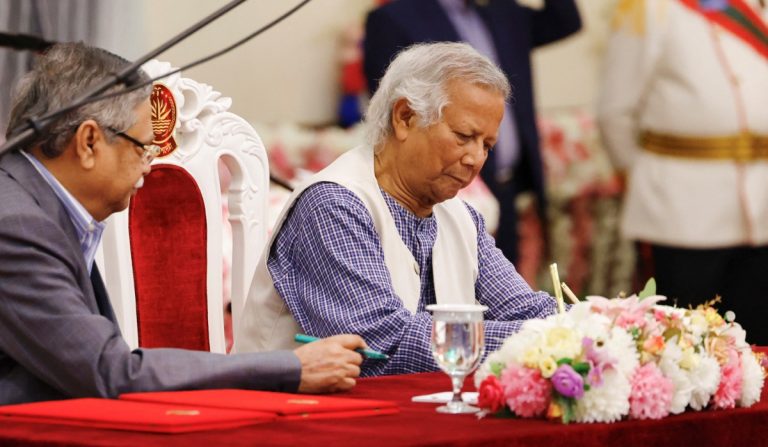DHAKA, Bangladesh — On Thursday, Muhammad Yunus, the Nobel Peace Prize laureate renowned for his pioneering work in microfinance, assumed leadership of Bangladesh’s caretaker government. His appointment comes in the wake of intense violence that has shaken the country, resulting in the resignation and escape of Prime Minister Sheikh Hasina to neighboring India.
Yunus, celebrated globally as the “banker to the poor,” is best known for founding Grameen Bank and spearheading the microcredit movement. His innovative approach to combating poverty through small loans to impoverished individuals who lack access to traditional banking services earned him the Nobel Peace Prize in 2006.
As the newly appointed chief adviser of the caretaker government, Yunus faces the formidable challenge of restoring stability to a nation that has experienced some of its most severe unrest in decades. His primary objectives include calming the violence and overseeing the organization of new parliamentary elections.
In his first address to the nation following his appointment, Yunus expressed optimism about the future. “The era of brutal, autocratic rule has ended,” he declared. “With the dawn of a new day, we will embrace democracy, justice, human rights, and the unencumbered freedom of expression for all citizens, regardless of their political affiliations. This is our mission.”
Earlier on Thursday, Yunus arrived in Dhaka after receiving medical treatment in Paris. During his arrival, he expressed deep gratitude to the student activists who supported his role in the caretaker government. Emotional and visibly moved, Yunus recalled a student who had been tragically shot during the recent protests, emphasizing that such sacrifices would not be forgotten.
The upheaval leading to Hasina’s resignation has been dramatic. Her departure, after securing a fourth term in January, sparked both celebration and chaos. Crowds stormed and vandalized her official residence, and violence has been particularly severe against Hindu communities. Reports indicate that Hindu homes, temples, and businesses were attacked, resulting in the deaths of at least one teacher and injuries to 45 others, according to the Bangladesh Hindu Buddhist Christian Unity Council. Many Hindus, who traditionally support Hasina’s secular Awami League party, have sought refuge in India, though their attempts have largely been unsuccessful.
The void left by Hasina’s resignation has been partially filled by Yunus’s appointment. President Mohammed Shahabuddin administered the oath of office to Yunus and his 13 advisers in a solemn ceremony at the presidential residence. The ceremony included a minute of silence to honor those who lost their lives in the recent unrest.
Two student leaders, Nahid Islam and Asif Mahmud, both in their mid-20s and instrumental in the protests, are among the advisers joining Yunus in the interim government. Additional advisers will be sworn in at a later date.
The interim government does not include representatives from Hasina’s Awami League party. In response, her son, Sajeeb Wazed Joy, has stated that the party remains active and is prepared to engage in negotiations with both the opposition and the caretaker government.
The main opposition party, the Bangladesh Nationalist Party (BNP), has boycotted two national elections following the arrest of its leaders. The BNP has called for new elections within three months, adding to the political tension.
Hasina’s current location in the New Delhi area has caused some friction between Bangladesh and India. Yunus has noted the discontent among Bangladeshis over her refuge in India. India’s foreign ministry has indicated that Hasina’s travel plans are her own concern and has not provided further updates.
India and Bangladesh share a deep cultural and economic connection, with New Delhi playing a crucial role in Bangladesh’s independence in 1971. Indian Prime Minister Narendra Modi extended congratulations to Yunus and affirmed India’s commitment to working with Bangladesh to achieve the shared goals of peace, security, and development. Modi expressed hope for a swift return to normalcy and the protection of minority communities.
The student-led movement that led to Hasina’s ousting began with protests over government job quotas in July. These demonstrations escalated into widespread violence, drawing international criticism, although the government has denied allegations of excessive force.

